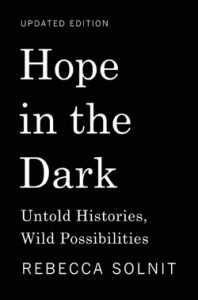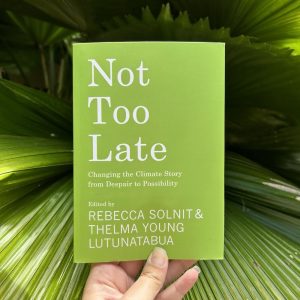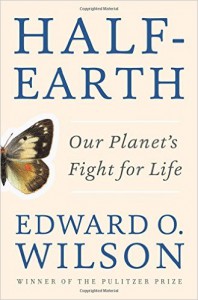 Rebecca Solnit’s book, Hope in the Dark: Untold Histories, Wild Possibilities, has become a newly popular source of consolation, illumination, and inspiration, as an increasing number of people are struggling with feelings of hopelessness in these dark times. Originally published in 2004, a new edition was published this year (2016), with a new foreword and afterword by the author. Solnit is active in the climate movement, among other social movements.
Rebecca Solnit’s book, Hope in the Dark: Untold Histories, Wild Possibilities, has become a newly popular source of consolation, illumination, and inspiration, as an increasing number of people are struggling with feelings of hopelessness in these dark times. Originally published in 2004, a new edition was published this year (2016), with a new foreword and afterword by the author. Solnit is active in the climate movement, among other social movements.
Here are a few short excerpts from the book. This is just a taste—just a few morsels of Solnit’s wisdom. I encourage you to pick up a copy of the book to read more.
“Your opponents would love you to believe that it’s hopeless, that you have no power, that there’s no reason to act, that you can’t win. Hope is a gift you don’t have to surrender, a power you don’t have to throw away.”
“Hope locates itself in the premises that we don’t know what will happen and that in the spaciousness of uncertainty is room to act. When you recognize uncertainty, you recognize that you may be able to influence the outcomes—you alone or you in concert with a few dozen or several million others. Hope is an embrace of the unknown and the unknowable, an alternative to the certainty of both optimists and pessimists. …It’s the belief that what we do matters even though how and when it may matter, who and what it may impact, are not things we can know beforehand. We may not, in fact, know them afterward either, but they matter all the same.”
“It’s important to say what hope is not: it is not the belief that everything was, is, or will be fine. The evidence is all around us of tremendous suffering and tremendous destruction. The hope I’m interested in is about broad perspectives with specific possibilities, ones that invite or demand that we act. It’s also not a sunny everything-is-getting-better narrative, though it may be a counter to the everything-is-getting-worse narrative. You could call it an account of complexities and uncertainties, with openings.”
“Authentic hope requires clarity—seeing the troubles in this world—and imagination, seeing what might lie beyond these situations that are perhaps not inevitable and immutable.”
“We cannot eliminate all devastation for all time, but we can reduce it, outlaw it, undermine its sources and foundations; these are victories. A better world, yes; a perfect world, never.”
“…You’d have to be an amnesiac or at least ignorant of history and even current events to fail to see that our country and our world have always been changing, are in the midst of great and terrible changes, and are occasionally changed through the power of popular will and idealistic movements.”
“Much has changed; much needs to change; being able to celebrate or at least recognize milestones and victories and keep working is what the times require of us. Instead, a lot of people seem to be looking for trouble, the trouble that reinforces their dismal worldview. Everything that’s not perfect is failed, disappointing, a betrayal. There’s idealism in there, but also unrealistic expectations, ones that cannot meet with anything but disappointment. Perfectionists often position themselves on the sidelines, from which they point out that nothing is good enough.”
“I have found that…a lot of people respond to almost any achievement, positive development, or outright victory with ‘yes but.’ Naysaying becomes a habit. It [boils] down to: we can’t talk about good things until there are no more bad things.”
“How do we get back to the struggle over the future? I think you have to hope, and hope in this sense is not a prize or a gift, but something you can earn through study, through resisting the ease of despair, and through digging tunnels, cutting windows, opening doors, or finding the people who do these things. They exist.”
“Hope is not a lottery ticket you can sit on the sofa and clutch, feeling lucky. It is an axe you break down doors with in an emergency. Hope should shove you out the door, because it will take everything you have to steer the future away from endless war, from the annihilation of the earth’s treasures and the grinding down of the poor and marginal… To hope is to give yourself to the future — and that commitment to the future is what makes the present inhabitable.”
All this being true, it’s also important to recognize that it’s an entirely normal (and unavoidable) emotional response for humans of conscience and compassion to feel despair sometimes, to temporarily lose hope, and to need a break (from the news, from our own efforts, from people, etc.). We must give ourselves permission to feel what we feel and to take care of ourselves. We can’t be effective activists or helpful to others when we’re broken down. We must all take turns taking breaks when we need them. Remember that the struggle is not on any one person’s shoulders, and you are not alone; others will carry on on the days when you can’t. And when you’ve recharged and regained some active hope, you can carry on for others.
Also see Rebecca Solnit’s July 2016 essay on this theme published in The Guardian, as well as her May 2016 essay in Harper’s magazine, “The Habits of Highly Cynical People.” Solnit is a contributing editor at Harper’s.
You can also follow her daily musings and posts on her Facebook page.
Also see this post:
Great Quotations: An Index
December 30, 2016
 Not Too Late: Changing the Climate Story from Despair to Possibility, short essays by a bunch of great climate experts and authors, edited by Rebecca Solnit and Thelma Young Lutunatabua
Not Too Late: Changing the Climate Story from Despair to Possibility, short essays by a bunch of great climate experts and authors, edited by Rebecca Solnit and Thelma Young Lutunatabua






